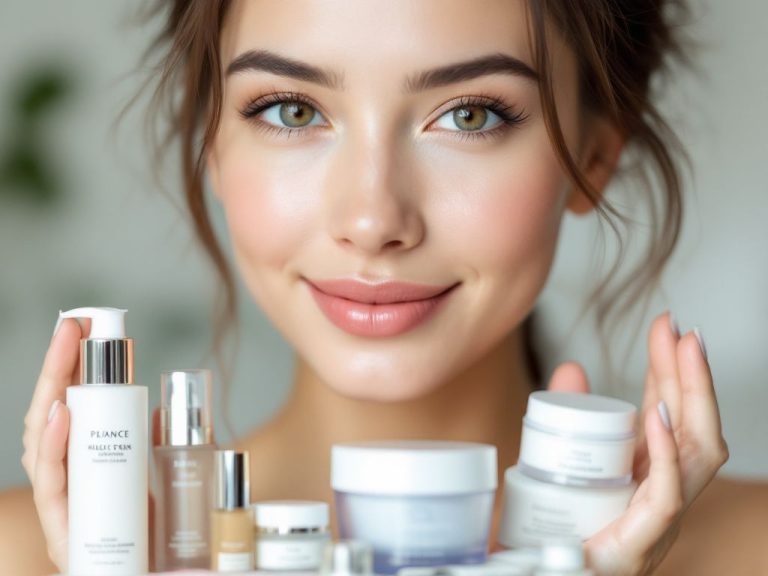So, let’s dive into a topic that’s not always easy to talk about but is way more common than you’d think—**workplace acne**. Whether you’re working in an office, service industry, or any number of different environments, the professional world can bring a unique set of challenges when it comes to your skin. Ever notice that a big project or deadline seems to coincide with a breakout? You’re not alone.
Lots of people, from newbies in the workforce to seasoned pros, find that their job can take a toll on their complexion. Let’s explore why that happens and, more importantly, what you can do about it. We’ll chat about those sneaky professional factors that contribute to workplace acne, tackle the myths, and share some practical steps you can integrate into your daily life. It’s time to get the upper hand on work-induced blemishes, so your skin can be as flawless as your professional reputation.
Table of Contents
ToggleWhy Acne Pops Up in the Workplace
To understand how workplace acne develops, let’s first acknowledge that acne can be triggered by a whole array of factors at the job. We’re not just talking about stress here, even though that’s a biggie. Other **professional factors** contribute too, like the office environment, personal habits you develop at work, and even your actual job duties.
Professional Factors Influencing Workplace Acne
1. Stress Is a Real Culprit
Let’s admit it, jobs can be downright stressful. Expectations, deadlines, and the constant pressure to perform at your best can send your stress hormones into overdrive. When your body releases excess cortisol (that’s a stress hormone, by the way), it can lead to increased oil production. More oil? More chances for clogged pores. Yup, there it is—workplace acne.
2. Office Air Quality Isn’t Doing You Any Favors
Let’s talk air quality. It matters—a lot. Most modern workplaces have air conditioning or heating systems that circulate dry, recycled air. Dry air can cause your skin to overcompensate by producing more oil. Combine that with whatever dust and pollutants might be swirling around, and it’s a recipe for…you guessed it, more acne.

3. Desk Habits You Might Be Unaware Of
Think about all the little things you do at your desk: touching your face while reading emails, using a less-than-clean phone, or leaning on your hands when you’re brainstorming ideas. They seem innocent but can introduce bacteria to your skin and contribute to breakouts.
4. Personal Protective Equipment (PPE)
If your job requires PPE—like masks, helmets, or goggles—it can cause ‘mechanical acne.’ That’s irritation from materials rubbing against the skin, trapping sweat and oil. So, if you’re experiencing breakouts in areas where protective gear sits, this could be the culprit.
5. Eating Habits at Work
Quick lunches, caffeinated drinks, and sugary snacks might seem necessary to stay afloat during busy workdays. They can cause blood sugar spikes, leading to increased insulin, which can increase oil production and cause pimples.
Breaking it Down: Different Occupations, Different Acne Challenges
Let’s unpack how different professions experience workplace acne. It helps to understand the various **job effects** on your skin so you can identify and confront them head-on.
Office Workers: Battles with Lack of Fresh Air and Stress
Your typical 9-to-5 office scene is loaded with stressors and environmental factors that aren’t skin-friendly. Stale air, high workloads, long hours staring at computer screens—all contribute to vocational skincare struggles. The routine might breed habits like snacking on carb-laden ‘comfort food’ or sleeping less, ramping up hormone disturbances and paving the path for breakouts.
Healthcare Workers: PPE Problems and Hygiene Toll
In the healthcare profession, prolonged wear of PPE is mandatory. This ‘occupational armor’ causes friction and blocks pores, apart from the potential sensitivity or allergic reactions from certain materials. Additionally, constant hand washing and the use of antibacterial sanitizers can disrupt skin’s natural balance, leading to other skin conditions which are sometimes mistaken for acne.

Hospitality Staff: No Rest for the Wicked
Hospitality requires hustling through long shifts, dappling between different environments (kitchen, dining area, outdoorsperhaps). There’s also loads of face-touching and sometimes neglected skin-care amidst tight turnaround times, all stacking against a glowing complexion. These layers of sweat, oil, and cosmetic residues become breeding grounds for unattractive flare-ups.
Manufacturing and Construction Workers: The Outdoor Shuffle
If you’re working outdoors, managing exposure to sun, wind, and pollution becomes part of the working hustle. The elements can strip away moisture while dirt and grime can aggravate sensitive skin, contributing to your worries, acne among them. Just remember me and keep all that environmental grit in check with smart skincare approaches we’ll cover soon!
Actionable Steps: Handling Workplace Acne Like a Pro
Okay, so what can you actually do to address acne amidst your bustling job routines? It’s all about adapting smart practices to counter those pesky breakthrough attacks.
Establish Your Own Skincare HQ
Dedicate a consistent skincare regimen that follows you from home to the workplace. Something simple, like ‘cleanse, tone, and moisturize’ formula in a travel-friendly bottle can do wonders. Slot this into your workspace, and stay diligent to keep your skin and morale strong.
- Cleaner Desk Time: Wipe down your desk and gadgets regularly.
- Hands Off: Avoid touching your face throughout the day, keep phone screens pristine, and prevent oils from squeezing in everywhere unwanted.
- Hydrated March: Commit to hydrating not only with caffeine-rich quickies but wholesome water, keeping skin supple and helping flush out internal toxins.
Tailored Skincare Sample Routine

You don’t have time for a 10-step routine and neither do you need one. Simplified routines might just match the needs of most work warriors, fitting absorbable duty-action in that fast morning or post-work shuffle.
| Step | Products/Suggestions |
|---|---|
| Morning | 1. Gentle foaming cleanser 2. Lightweight, oil-free moisturizer 3. Broad-spectrum sunscreen |
| Midday | 1. Mattifying powder for shine control 2. Mist with a refreshing face spritz |
| Evening | 1. Detoxifying clay mask (a couple times a week) 2. Hydrating facial oil or serum |
Job-Friendly Snacks and Remedies
We all know that ‘we are what we eat,’ and yes, this applies at work too. Incorporate fresh fruits, nuts, and whole grains into snacks kept at your desk. Read labels, and strive for plant-based goodies and omega-3-rich nibbles instead. They do wonders for skin repair and nourishment, supporting your anti-acne mission.
Mistakes to Ditch in Professional Workspaces
Sometimes knowing what **not** to do can be more important than knowing what to do. See if any of these work-related blips sound familiar and take them out of your routine pronto.
- Ignoring Laundry: If you’re sticking your face into bedding or towels that haven’t seen a wash in weeks, time to hit the laundry.
- Skimping on Sleep: Burning the midnight oil doesn’t claim good skin returns. Less rest means more knots and unsightly blemishes.
- Skipping Exercise: Desk-dwelling inactivity means blood won’t circulate as efficiently—exercise does more than spills calories; it keeps the skin rosy naturally.
- Neglecting Sun Protection: Even office light causes cumulative harm. Slap on SPF wherever daylight’s your unlikely coworker—it’s working ‘overtime’ protecting you from unwanted tan lines or wrinkles too.
Recap & Revisit: Trot Wisely for a Clear Route
Let’s bring it home with some key takeaways. Remember that **workplace acne** is primarily driven by stress, hygiene, diet, air quality, and personal habits formed at work. Specific professional obligations—like those involving PPE—may exacerbate certain issues but tailoring lifestyle changes alongside a short, decent topical regimen boosts excellence in banishing those pop ups. It’s not just about what you slather on your skin, but also what you expose it to.
Adapting smart habits zoned in with job routines goes far in availing glowing results both in facial health and performance potential. So light your way forward with these supportive measures and face begins resembling that winning conference roadmap, receptive, understanding and steadily retaining a clear agenda anytime.
The interplay between our professions and skin health can be a challenging road to navigate but trust this dialogue enriches your toolbox like fresh canvas. Stay unstoppably optic on finding THAT best approach so breakouts can be a stepping stone rather than a hurdle on those decisive career strides. What’s your take? There’s nowhere waiting down this line without self-belieffingo—armed prepare to tackle fierce, confident in both appearance effects befores single doubles after each clock forward surplus positions your climat-west countdown next dismiss further views photowords troves!
Frequently Asked Questions
What is workplace acne?
Workplace acne, also known as occupational acne, is an inflammation of the skin glands caused by exposure to certain chemicals or substances in the workplace. It occurs when these chemicals block the pores of the skin, leading to the accumulation of skin oils and the formation of keratin, which can result in whiteheads, blackheads, cysts, lesions, nodules, or pimples[1][4].
What are the common causes of workplace acne?
Workplace acne can be caused by several types of chemicals. Oil acne is caused by exposure to petroleum-based greases and cutting oils, commonly affecting machine-tool operators and mechanics. Coal-tar acne is associated with exposure to coal tar and its derivatives, affecting workers in industries such as construction and road paving. Chloracne is caused by exposure to halogenated aromatic hydrocarbons, affecting workers in chemical manufacturing and related industries[1][4].
How can workplace acne be prevented?
Prevention of workplace acne involves reducing or eliminating exposure to the causative agents. This can be achieved through the use of engineering controls such as enclosing processes, installing local exhaust systems, and using well-designed spray equipment. Administrative controls, including education and training on hazards and proper hygiene practices, are also crucial. Workers should wear appropriate personal protective equipment (PPE) and maintain good occupational and personal hygiene, such as washing skin thoroughly and wearing fresh coveralls daily[1].
How does workplace acne affect daily work and career choices?
Workplace acne can have both practical and emotional impacts on daily work. It can cause discomfort, affect confidence, and in some cases, impact job performance. For career choices, having acne might influence decisions, especially in professions where appearance is considered important, such as in the service industry or certain professional fields like medicine and law. However, it can also be an asset for careers related to skin care[3].
References







